Podcast
Questions and Answers
What event marked a turning point for the Republic?
What event marked a turning point for the Republic?
- The initial bonding of the triumvirs
- The end of the alliance (correct)
- The death of Crassus
- The rise of the Senate
The collapse of the alliance between Caesar, Pompey, and Crassus strengthened the political system of Rome.
The collapse of the alliance between Caesar, Pompey, and Crassus strengthened the political system of Rome.
False (B)
What major internal conflict contributed to the downfall of the Republic?
What major internal conflict contributed to the downfall of the Republic?
The disputes between Caesar and Pompey
Crassus's defeat and death in battle further __________ the alliance.
Crassus's defeat and death in battle further __________ the alliance.
Match the events or figures with their impact on the Republic:
Match the events or figures with their impact on the Republic:
Which factor did NOT contribute to the collapse of the Republic?
Which factor did NOT contribute to the collapse of the Republic?
The collapse of internal conflicts led to a stronger Senate.
The collapse of internal conflicts led to a stronger Senate.
What transformation did Rome undergo after the collapse of the Republic?
What transformation did Rome undergo after the collapse of the Republic?
The ambitions and motivations of the triumvirs __________ their initial shared goals.
The ambitions and motivations of the triumvirs __________ their initial shared goals.
Match the trio of leaders with their roles in the alliance:
Match the trio of leaders with their roles in the alliance:
Who were the three main politicians in the First Triumvirate?
Who were the three main politicians in the First Triumvirate?
The First Triumvirate was formed due to strong ideological alignment among its members.
The First Triumvirate was formed due to strong ideological alignment among its members.
What was one of the main goals of Caesar within the Triumvirate?
What was one of the main goals of Caesar within the Triumvirate?
Marcus Licinius Crassus was known for his immense ______ which he utilized in political maneuvers.
Marcus Licinius Crassus was known for his immense ______ which he utilized in political maneuvers.
What significant event helped to cement the power of the First Triumvirate?
What significant event helped to cement the power of the First Triumvirate?
Match the key figures of the First Triumvirate with their primary focus:
Match the key figures of the First Triumvirate with their primary focus:
The First Triumvirate resulted in a decline of individual power among its members.
The First Triumvirate resulted in a decline of individual power among its members.
The First Triumvirate was active between ______ and 53 BCE.
The First Triumvirate was active between ______ and 53 BCE.
What was the impact of the First Triumvirate on Roman politics?
What was the impact of the First Triumvirate on Roman politics?
Which factor contributed to the formation of the First Triumvirate?
Which factor contributed to the formation of the First Triumvirate?
Flashcards
First Triumvirate
First Triumvirate
An informal alliance formed in the late Roman Republic between three prominent politicians: Julius Caesar, Pompey the Great, and Marcus Licinius Crassus.
Political Instability in the Roman Republic
Political Instability in the Roman Republic
Political instability and power struggles within the Roman Republic were rampant. The Senate's influence was declining, and factions were emerging, creating power vacuums.
Motivation for the Triumvirate
Motivation for the Triumvirate
The three members recognized the need for a united front to achieve their individual goals, particularly in pursuit of political power and military success.
Julius Caesar
Julius Caesar
Signup and view all the flashcards
Pompey the Great
Pompey the Great
Signup and view all the flashcards
Marcus Licinius Crassus
Marcus Licinius Crassus
Signup and view all the flashcards
Marriages in the Triumvirate
Marriages in the Triumvirate
Signup and view all the flashcards
Triumvirate's Objectives
Triumvirate's Objectives
Signup and view all the flashcards
Impact of the Triumvirate
Impact of the Triumvirate
Signup and view all the flashcards
Military Successes of the Triumvirate
Military Successes of the Triumvirate
Signup and view all the flashcards
The First Triumvirate
The First Triumvirate
Signup and view all the flashcards
Assassination of Julius Caesar
Assassination of Julius Caesar
Signup and view all the flashcards
Roman Civil Wars
Roman Civil Wars
Signup and view all the flashcards
Roman Senate
Roman Senate
Signup and view all the flashcards
Fall of the Roman Republic
Fall of the Roman Republic
Signup and view all the flashcards
Roman Republic
Roman Republic
Signup and view all the flashcards
Roman Empire
Roman Empire
Signup and view all the flashcards
Internal Conflicts
Internal Conflicts
Signup and view all the flashcards
Crassus's Defeat and Death
Crassus's Defeat and Death
Signup and view all the flashcards
Diverging Ambitions
Diverging Ambitions
Signup and view all the flashcards
Caesar and Pompey's Rivalry
Caesar and Pompey's Rivalry
Signup and view all the flashcards
Study Notes
The First Triumvirate: Key Players and Events
- The First Triumvirate was an informal alliance between three prominent Roman politicians: Julius Caesar, Pompey the Great, and Marcus Licinius Crassus.
- It emerged in the late Roman Republic, roughly between 60 and 53 BCE.
- The alliance was primarily motivated by political ambition and personal interests rather than shared ideology.
Factors Leading to the Formation
- Political instability and power struggles within the Roman Republic were rampant.
- The Senate's influence was declining, and factions were emerging, creating power vacuums.
- The triumvirate members recognized the need for a united front to achieve their individual goals.
- These goals included gaining political power and military success: Caesar's ambition to expand Roman territories and attain glory; Pompey's desire to solidify his military reputation; Crassus's aim to gain wealth and prestige.
Key Figures and Their Roles
- Julius Caesar: A renowned general, politician, and author. He used his military successes to gain popularity and eventually dominate the alliance. He was a shrewd political strategist, adept at manipulating public opinion.
- Pompey the Great: A successful general and statesman; he had gained popularity through his military campaigns. He possessed immense prestige within the army.
- Marcus Licinius Crassus: A wealthy businessman and politician who had amassed immense personal wealth. He was politically ambitious, and his wealth served as a resource for political maneuvers.
The Triumvirate's Agreement and Objectives
- A key agreement involved arranging advantageous marriages between the families of the members. These political marriages further cemented their close ties and consolidated power.
- Through their alliance, they aimed to control the Roman political system and shape policies in their favour.
- The relationship was initially beneficial to all three: Caesar gained support and political backing, Pompey received support against potential political enemies, and Crassus found allies in his political ambitions.
Impact and Legacy of the Triumvirate
- The First Triumvirate had significant impact on Roman politics and stability.
- It marked a notable shift in power dynamics, highlighting the rise of powerful individuals over the traditional Senate.
- The alliance led to significant military successes, furthering Roman expansion.
- It ultimately contributed to an unstable political climate, setting the stage for civil strife.
- The alliance's end marked a turning point for the Republic. Its collapse through internal conflicts, namely the disputes between Caesar and Pompey which led to civil war, dramatically undermined the political system and brought about Rome's eventual transformation from a republic to an empire.
Factors Behind the Breakdown
- Growing rivalry and ambition between Caesar and Pompey were major causes.
- Crassus's defeat and death in battle further destabilized the alliance.
- The triumvirs' individual ambitions and motivations often diverged, ultimately surpassing the shared goals that had initially bonded them.
- The political turmoil and resulting civil war weakened the authority of the Senate and the Republic.
Studying That Suits You
Use AI to generate personalized quizzes and flashcards to suit your learning preferences.



